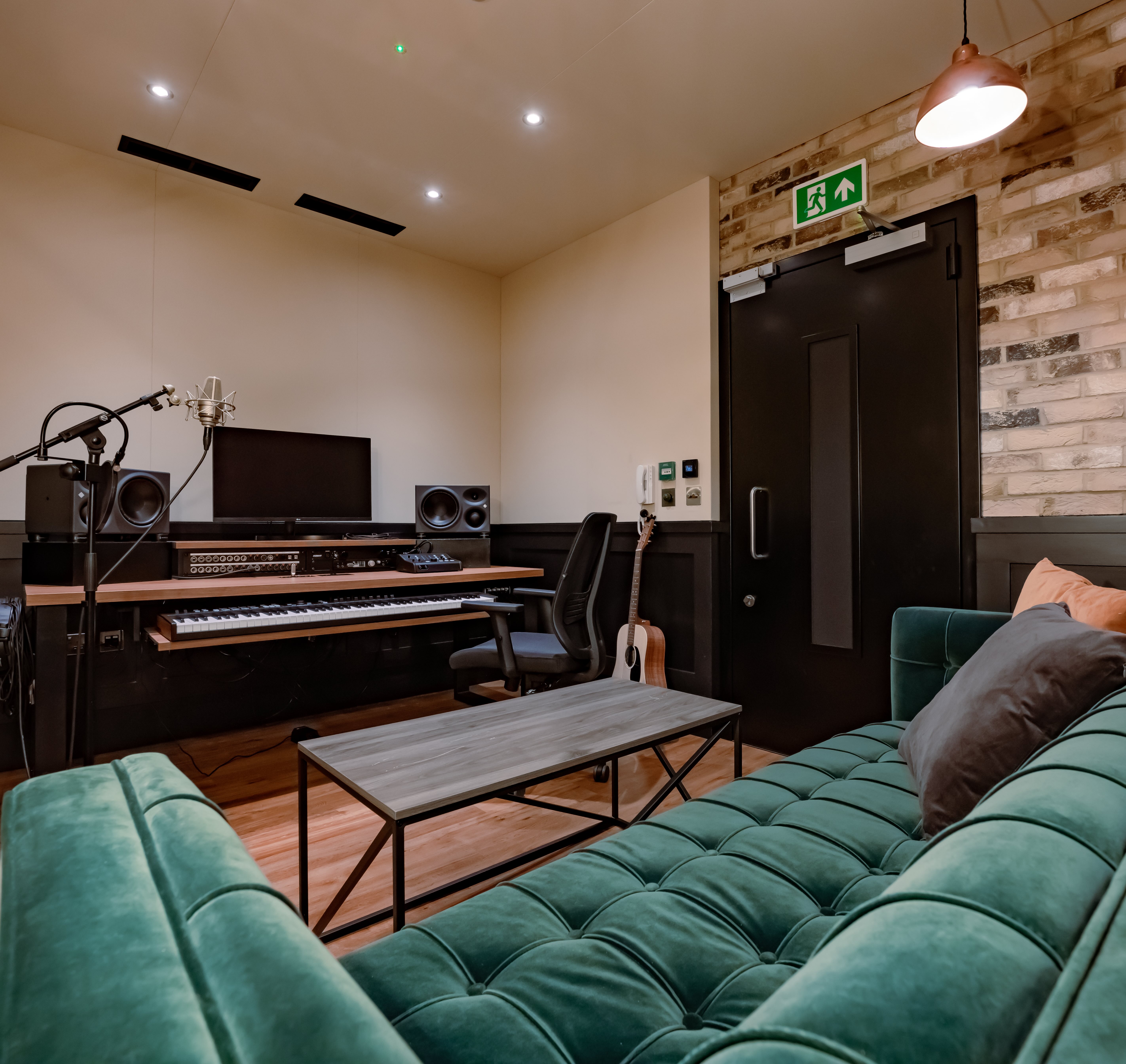How to Launch Your Music Career in 2026
This guide offers clear, genuine steps for emerging musicians to create music, grow their brand, and build sustainable careers, using proven strategies backed by real-world advice.
An emerging music artist can create music, distribute globally, and build a career independently. Social media and streaming platforms have levelled the playing field, but with independence comes greater responsibility. Artists must now balance creativity with business skills, treating their careers like a business operation from day one.
Professional spaces like TYX Studios support independent artists aiming to deliver high-quality releases early on.In this guide on how to start a music career, we dive into proven strategies from across the industry to help you navigate today's landscape.
Understand the modern music industry

The music industry in 2026 is dynamic, decentralised, and rapidly evolving.
Independent artists now account for a large share of streaming revenues, with many musicians finding success without ever signing traditional record deals.
Platforms like Apple Music, Amazon Music, and Spotify offer unprecedented access to global audiences, levelling the playing field for emerging artists.
At the same time, the resurgence of physical formats like vinyl reflects a demand for tangible, emotional connections with music.
While major streaming services dominate, fans increasingly support artists through merchandise, exclusive releases, and direct-to-fan models.
Understanding how to distribute your music effectively and legally protect it under music copyright laws is essential for building a sustainable career.
In addition to streaming, music licensing deals have become major revenue streams for emerging artists.
Music publishers now actively scout independent talent to place songs in film, TV, games, and adverts.

Platforms like TuneCore and DistroKid act as music aggregators, allowing musicians to distribute their work across major outlets without relinquishing ownership.
However, many musicians note that navigating this landscape is both a blessing and a challenge. A Reddit user positively remarked:
"This is honestly the best time to be an independent artist. You don't need a label anymore – if you hustle smart, you can create your entire business operation yourself."
This enthusiasm reflects the empowerment felt by artists who embrace modern tools and strategies.
Conversely, others express caution about the realities of saturation, like in this Reddit comment:
"There are too many musicians online now. It's like shouting into a void. Good music isn't enough – you need smart marketing too."
While opportunity abounds, breaking through the noise demands a strong understanding of branding, promotion, and audience engagement.
In short, today's music industry offers vast opportunities for independent musicians willing to treat their music career like a business.
The shift towards independence, combined with the power of social media and streaming algorithms, places control firmly in the hands of artists, but only those who are proactive, strategic, and willing to adapt.
Find your unique path

In today’s music landscape, there is no single route to success. Some thrive as a recording artist, others flourish behind the scenes as a music producer, songwriter, or even tour manager.
Few artists follow the same route to success. Understanding your strengths, passions, and goals will help you carve out a pathway that suits both your creative sides and your desired lifestyle.
Exploring different creative careers early on can reveal hidden talents and unexpected strengths.
Many musicians start by performing live at local music venues before transitioning into music production or sync licensing.
Joining a local support group, finding artists to collaborate with, or partnering with a family member or musician friend often sparks unexpected creative opportunities.

One comment from a Reddit user shares their journey:
"I thought I wanted to be the frontman, but working in a studio felt so much better for me. Producing gave me more freedom, and now I'm working with other musicians I respect."
This shows that being open to non-traditional roles can lead to fulfilling and sustainable careers.
Others take a neutral stance, recognising that flexibility is key, as this Reddit comment explained:
"You might start one way, but don't be surprised if your path shifts. Many musicians evolve from performing to producing, or from local gigs to online-only careers."
Remaining adaptable allows you to seize opportunities as they arise and keep your music career moving forward.
Ultimately, defining your path means balancing passion with pragmatism. Not everyone will perform live, tour the world, get signed with a record label or front a band, and that's perfectly acceptable.
Finding a niche that complements your skills and aspirations is far more important than fitting into a preconceived mould.
Set clear, realistic goals

Setting clear, achievable goals is vital when building a music career.
Without direction, it is easy to drift aimlessly or become overwhelmed by the sheer volume of tasks needed to succeed. Goals act as stepping stones, keeping you focused on tangible progress rather than vague ambitions.
Short-term goals could include recording your first song, building a basic, clean and professional website, or securing your first booking at a local music venue.
Longer-term goals might involve securing sync licensing deals, finding a music publisher for your work, or building a loyal online fanbase across multiple social media accounts.
A Reddit user shared:
"Your goals will change as you figure out your path. It's fine to adjust them once you learn more about the industry and yourself."
Flexibility ensures that your plans remain relevant as you gain experience and encounter new opportunities.
Ultimately, realistic goal-setting bridges the gap between dreaming about a music career and actively building one. Maintaining a strong work ethic during slow periods is essential for long-term success.
Invest in your craft

No matter how strong your branding or promotion strategies are, the foundation of any music career is quality music.
Consistent improvement of your skills, from songwriting to live performance to music production, ensures that you remain competitive and evolve creatively. Listeners subconsciously compare emerging musicians to established artists, expecting the same level of professionalism and polish.
Investing time and resources wisely is critical.
Use free resources like YouTube tutorials, join Reddit music communities, or enrol in professional courses through platforms like Berklee Online. Booking professional studio time at places like TYX Studios can also elevate your work beyond what is possible in basic acoustic settings at home.
One Reddit comment explained:
"Start small. Free tutorials, basic equipment, and steady practice. Upgrade when you outgrow your current level."
Strategic investment, rather than impulsive spending, ensures long-term growth without unnecessary financial pressure. Many musicians stall because they stop developing after their initial success, losing the momentum that sustained growth requires.
Popular tools for music education: Berklee Online via Coursera, YouTube, Andrew Huang, and Produce Like A Pro teach you the skills pros use, without the student debt.
Build your brand and online presence

In 2026, your brand identity is as important as your music.
Fans expect consistency across your social media accounts, artwork, live shows, and merchandise.
Building a strong brand helps potential fans subconsciously associate your music with a certain feeling, mood, or visual style.
A clean and professional website acts as your central hub for booking agents, potential team members, and fans.
Investing in a professional photographer for press photos and maintaining a cohesive aesthetic across Instagram, TikTok, and YouTube strengthens your credibility.
Consistency across visuals, messaging, and tone helps your audience trust you faster.
This Reddit user comments:
"Branding’s important, but don't lose yourself chasing trends. Build something authentic you can sustain for years."
Authenticity must be the core of your brand to ensure long-term career stability, even as platforms and trends change.
Ultimately, a well-developed brand identity doesn’t just look good; it gives you a competitive edge across all platforms, helping your music stand out in a saturated digital space.
Popular tools for design and visuals: canva, Figma, and Adobe Express help you create branded assets like album covers, promo graphics, and social content with ease.
Master the power of technology

In 2026, mastering technology is not optional; it is central to building a sustainable music career.
However, focusing on the creative aspects that technology enhances remains crucial to standing out authentically.
Affordable software, personal laptops, and accessible recording equipment have transformed how musicians create, distribute, and promote music.
Many artists now produce professional-quality tracks entirely from home before releasing music online across major streaming platforms.
Platforms like DistroKid, CD Baby, and TuneCore act as music distributors, making it possible for independent artists to upload their songs directly to Apple Music, Spotify, Google Play, and other digital sales platforms.
This removes traditional barriers and allows artists full control over how their work is presented and monetised.
Understanding how to use digital aggregators effectively ensures your releases are delivered professionally and on time.
This Reddit user offers insight:
"You don't have to master everything. Pick the tools that fit your workflow and focus there first."
Strategic use of technology, rather than chasing every trend, allows musicians to create music more efficiently without feeling overwhelmed.
Ultimately, those who understand and leverage the right technological tools are better positioned to maintain control over their careers, reach wider audiences, and scale their creative businesses effectively.
Use AI to work smarter, not harder
AI tools are changing the game in 2026. From AI-generated melodies and beat creation to mastering plugins that rival professional engineers, smart tech can seriously boost your creative output.
Tools like LANDR, Lalal.ai, and iZotope help speed up production without compromising quality. On the promo side, AI-driven platforms can help you write better emails, schedule posts, and analyse fan engagement across platforms.
The trick? Don’t try to use everything, pick what solves a real problem for you. Whether you’re stuck on a hook or need help planning your next single release, there’s probably a tool out there to take the pressure off.
Popular tools for AI-powered music creation: LANDR, Lalal.ai, and Moises.ai help with mastering, vocal separation, and stem editing.
Release and promote your music strategically

Simply creating quality music is not enough; you must focus on getting your music heard across platforms and building lasting fan engagement.
Dropping new music consistently helps you stay visible in playlist algorithms and maintain fan interest.
Understanding how to optimise your releases for your target audience and algorithmic discovery is as important as the quality of the music itself.
Music promotion requires working across various channels, including TikTok, YouTube, and Instagram.
Collaborating with local artists, playlist curators, and micro-influencers expands your reach while building an engaged audience.
Documenting your studio time, creative process, and live performances helps humanise your brand and keeps fans invested.
A Reddit comment offered insight:
"Both strategies work depending on your fanbase size. New artists should probably focus on singles until the demand for an album actually exists."
Timing and audience readiness are critical to deciding your release approach.
Strategic releases not only build momentum but also give each piece of music the best chance to reach, resonate with, and retain listeners over time.
Popular tools for distribution: DistroKid, TuneCore, and CD Baby let you release music to Spotify, Apple Music, and more without needing a label.
Use your data like a pro
If you're not looking at your numbers, you’re flying blind. Platforms like Spotify for Artists, YouTube Analytics, and TikTok Insights show you exactly what’s working and what’s not.
Find out:
- Which songs keep listeners hooked
- Where your fans are located (perfect for gig planning)
- What times and types of content get the most love
Use this info to tweak your strategy and double down on what’s getting traction. Smart artists use data to plan smarter releases, not just post and hope.
Popular tools for data and analytics: Spotify for Artists, Chartmetric, and Soundcharts show where your music is trending and who’s listening.
Make connections and grow your audience

Strong networks and genuine audience engagement are fundamental pillars of a thriving music career.
Collaborating with other musicians, producers, and industry professionals not only boosts your credibility but also expands your reach.
Attending events at local music venues, working with a musician friend, or connecting with potential team members like tour managers and booking agents can open valuable doors.
Building relationships with local artists strengthens your presence in your community and often leads to early live performance opportunities.
Working with recording studios like TYX Studios can also introduce you to other musicians and producers who share your creative vision.
Partnerships allow you to cross-pollinate fan bases, while collaborations keep your content pipeline active and fresh.
Audience engagement must be equally authentic. As one Reddit comment put it:
"You don't need thousands of fans right away. Focus on building a loyal few, and they’ll naturally spread your music."
Direct interaction, like responding to comments, sharing behind-the-scenes moments, and thanking fans personally, creates emotional investment that paid promotion alone cannot buy.
Building meaningful relationships, both within the music community and with your audience. It turns casual listeners into long-term supporters, laying a strong foundation for sustainable growth.
Popular tools for finding collaborators: SoundBetter, Vocalizr, and Fiverr connect you with session vocalists, producers, and mix engineers worldwide.
Build income streams and stay resilient
Creating a sustainable music career means building diverse income streams and remaining adaptable to a changing industry.
Relying solely on streaming royalties is risky, especially given how little platforms pay per stream.
Most musicians today supplement their earnings through live performances, merchandise sales, sync licensing, direct-to-fan digital sales platforms, and even starting their own label.
You should expect fans to form strong opinions within seconds based on your visuals and messaging.
Exploring different income streams strengthens your financial base while giving superfans more ways to support you.
Merchandise, exclusive vinyl releases, and limited-run experiences often generate more revenue than streams alone.
Registering your songs with music publishers or pitching for sync licensing deals can also create lucrative opportunities beyond standard releases.
This Reddit user comments:
"You need a business plan, even if you're a solo artist. Creativity without strategy won't pay the bills."
Treating your creative career like a business from the beginning gives you structure, direction, and greater long-term stability.
In an unpredictable industry, resilience is just as important as talent.
Staying committed through setbacks, continuing to adapt to new opportunities, and maintaining multiple income streams give you the best chance of building a lasting, fulfilling music career.
Turn your fans into superfans...and income

Streaming is just one piece of the puzzle. In 2026, musicians are turning casual listeners into superfans using extras like:
- Exclusive content on platforms like Patreon or Fourthwall
- Crowdfunding your next project (Bandcamp + Kickstarter are still thriving)
- Virtual gigs and private Zoom concerts
- Limited edition merch drops or NFTs (if that’s your thing)
These let fans support you in a real way: while you build income without relying on algorithms.
Popular tools for fan monetisation: Patreon, Fourthwall, Ko-fi, and Bandcamp let you earn from superfans through merch, subscriptions, and direct sales.
Conclusion
Building a music career in 2026 is more possible than ever, but it demands more than just talent. Success today means mastering your craft, building a strong brand, connecting authentically with fans, and treating your career like a business.
The tools are available, the audience is waiting: now it's your time to make your music heard.
Ready to take your sound to the next level?

TYX Recording Studios in London is nestled in the heart of London's creative hub. As part of the Tileyard Group, we offer emerging musicians access to world-class recording, mixing, mastering, and production facilities in a collaborative, forward-thinking environment.
Whether you're laying down your first track or refining your next single, TYX provides the space, equipment, and engineering support to make your music release-ready. The team also supports artists beyond the studio, helping with brand activation, creative development, and preparing you for a professional release strategy.
Step into a space where quality meets opportunity; where new artists are supported at every stage of their journey.
Frequently Asked Questions
While home recording can work, recording at TYX Studios provides professional sound quality that is essential for competing on major outlets and licensing platforms.
TYX Studios offers recording, mixing, mastering, and production consultation, helping you build a clean and professional website presence alongside quality music releases.
Beyond studio work, TYX Studios fosters networking opportunities with producers, tour managers, and other artists, crucial for expanding your professional circle.
Focus on producing quality music, registering your songs properly, and pitching them through music publishers, aggregators, or direct sync libraries.
Record a high-quality first song, create music profiles across streaming platforms, build a basic website, and start growing your audience consistently.

















